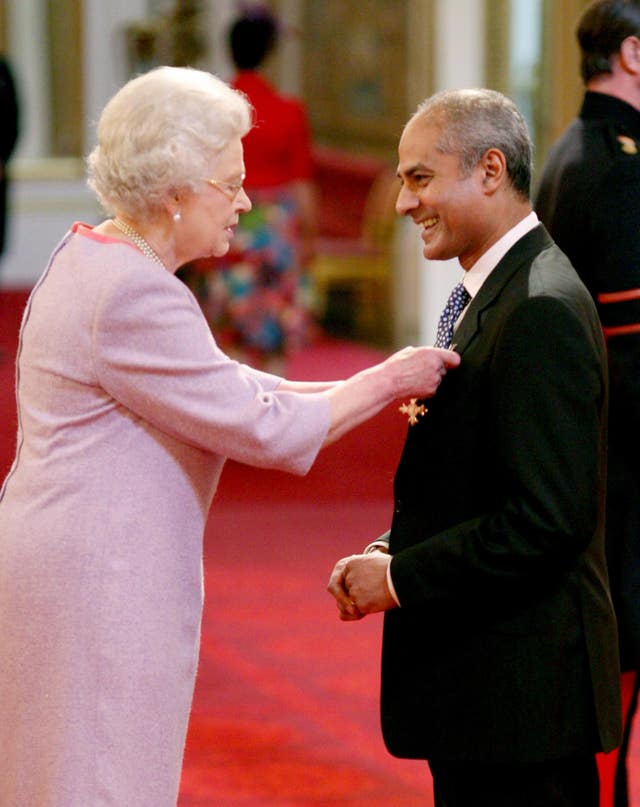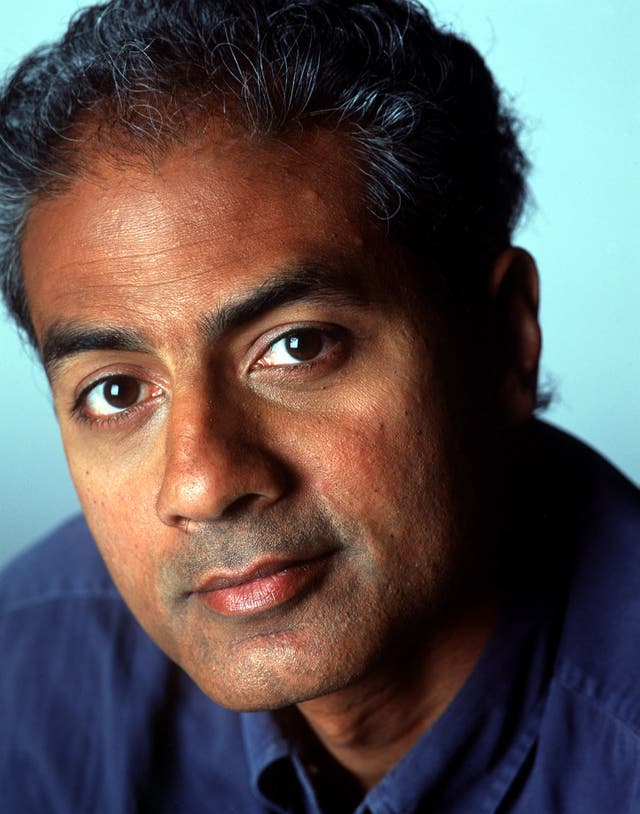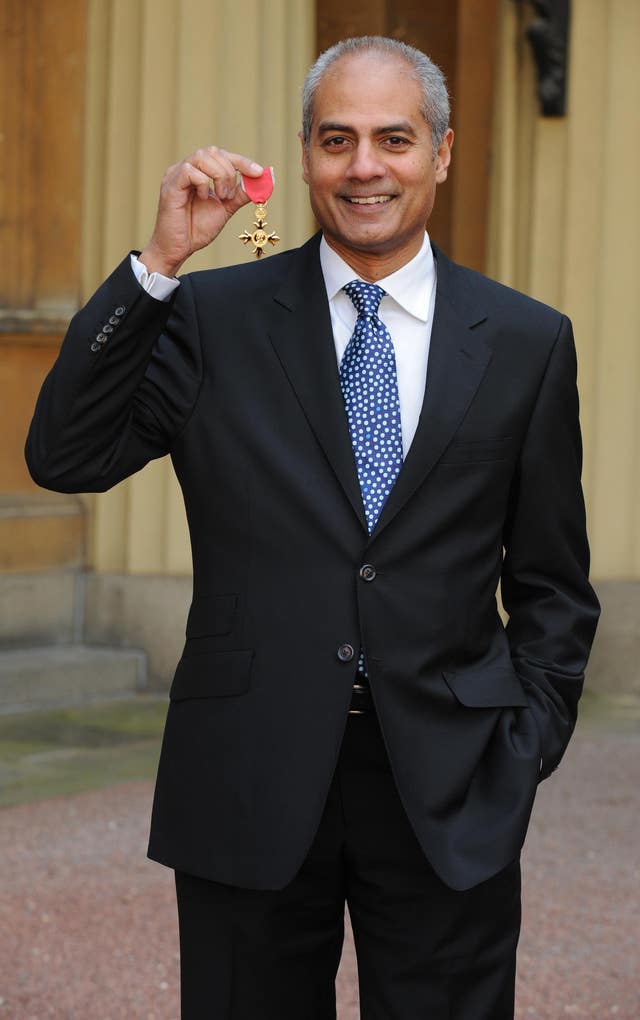George Alagiah says he saw ‘life as a gift’ in final report on BBC News
The award-winning journalist was a leading foreign correspondent for the BBC before becoming a presenter.

The late BBC newsreader George Alagiah said in a final report on BBC News “I have gotten to a place to see life as a gift”.
The award-winning journalist, who had presented the BBC News At Six for the last 20 years, died on Monday from bowel cancer after being first diagnosed in 2014. He was 67.
At the end of Monday’s edition of the programme, his former colleague Sophie Raworth revealed Alagiah had hoped to come into the BBC studio one last time to thank the viewers but did not get the chance.
“My life, for what it is worth, is divided into pre-cancer and post-cancer. The weird thing about a bowel cancer journey is you don’t really know the beginning and you don’t really know the end,” he said in the video.
“So I know the day I was diagnosed with bowel cancer, but I don’t know when it started. Because I was at the top of my game, I was having a fantastic time at work and home, and then suddenly you hear those words ‘I’m sorry to tell you Mr Alagiah, you’ve got bowel cancer’.
“At first when you’re told, you don’t know how to respond and it took me a while to understand what I needed to do.”
He continued: “For me, I had to get a place of contentment and the only way I knew how to do that was literally to look back at my life.
“Actually, when I look back to my journey, where it all started, looked at the family I had, the opportunities my family had, the great good fortune to bump into Fran who’s been my wife and lover for all these years. The kids that we brought up, it didn’t feel like a failure.
“I wish I hadn’t had cancer, obviously. But I have cancer and I’m glad of the things I’ve learned about myself and about my community, my friends and my family as a result
“I have gotten to a place to see life as a gift. Rather than kind of worrying about when it’s going to end and how it’s going to end, I’ve got to a place where I can see it for the gift it is. I feel that gift keenly every morning.”

She recalled launching the evening news show with him 20 years in January 2003, saying that he felt “enormously proud and privileged” to be presenting the programme.
“He loved being in the newsroom, being part of the team, and he made a good cup of tea as well. We all adored him,” she added.
“He felt a real connection with the audience too. After he was diagnosed with cancer, just over nine years ago, he received thousands of letters and messages from people who wrote to him as if they knew each other, strangers who spoke to him as a friend.
“He was really touched by your support. George was a man of great values and indomitable spirit. A big smile of velvety love, a great friend.”
BBC newsreaders Clive Myrie and Naga Munchetty fought back tears earlier in the day as they delivered the news of his death on air.
Broadcaster Myrie became emotional as he paid tribute to Alagiah during the lunchtime BBC News broadcast, saying: “On a personal note, George touched all of us here in the newsroom with his kindness and generosity, his warmth and good humour.
“We loved him here at BBC News and I loved him as a mentor, colleague and friend.
“His spirit, strength and courage in the later years of his life is something his family can be so proud of. Journalism has lost a giant.”

As her voice broke, she said: “Apologies for the emotion in my voice – he was so loved in our newsroom.”
Alagiah, who was born in Sri Lanka, continued to present for the BBC when he was not receiving treatment.
He joined the corporation in 1989 and spent many years as one of its leading foreign correspondents before moving to presenting.
He was a specialist in Africa and covered the civil wars in Somalia and Liberia as well as the genocide in Rwanda 20 years ago.
Throughout his career he interviewed central political figures, among them former South African president Nelson Mandela, Archbishop Desmond Tutu and ex-Zimbabwean leader Robert Mugabe.
He was nominated for a Bafta in 1994 for his coverage of Saddam Hussein’s genocidal campaign against the Kurds of northern Iraq and was named Amnesty International’s journalist of the year in 1994 for reporting on the civil war in Burundi.
He first began hosting the 6pm news bulletin in early 2003, but stepped up to front it solo four years later following the departure of his co-host, Natasha Kaplinsky.
Kaplinsky wrote on Instagram: “Goodbye dearest George. I will miss you so very much. It was such a privilege to be your friend.”
BBC director-general Tim Davie said: “Across the BBC, we are all incredibly sad to hear the news about George. We are thinking of his family at this time.
“George was one of the best and bravest journalists of his generation who reported fearlessly from across the world as well as presenting the news flawlessly.
“He was more than just an outstanding journalist, audiences could sense his kindness, empathy and wonderful humanity. He was loved by all and we will miss him enormously.”
Question Time presenter Fiona Bruce said Alagiah was “that rare thing – a first-rate journalist and an all round lovely human being.”
She added: “Integrity and decency shone through him. That and a mischievous sense of humour with an endearing giggle.”
In a piece for the Telegraph, Bruce recalled being selected alongside Alagiah in 1999 as one the new faces of BBC News, saying: “George was a brilliant choice, whether he knew it was coming or not.
“Authority and warmth is what you are always after when anchoring a live news broadcast. George had both in spades, and it came from such an authentic place.”
She added that having him as a colleague and friend when they were both propelled into the public eye was “always immensely comforting” as she knew he was one of the few people she could “absolutely trust”.
Nick Robinson, presenter of BBC Radio 4’s Today programme, paid tribute saying: “George was a brilliant journalist, a lovely man and an inspiring example to all fighting serious illness. His friends will miss him deeply.”
Broadcaster John Simpson said: “A gentler, kinder, more insightful and braver friend and colleague it would be hard to find.
“I loved having his company in the BBC World Affairs Unit, and his progress after that was a pleasure to watch.”
Former BBC correspondent Jon Sopel added: “Tributes will rightly be paid to a fantastic journalist and brilliant broadcaster – but George was the most decent, principled, kindest, most honourable man I have ever worked with. What a loss.”
Labour leader Sir Keir Starmer said he was “deeply saddened” by news of Alagiah’s death.
He said: “A much-loved face of BBC News for decades, George will also be remembered for his brilliant, fearless journalism as foreign correspondent. He rightly won awards for his evocative, boundary pushing reporting. British journalism has lost a talent. My thoughts are with his family and loved ones.”
After his diagnosis Alagiah endured two rounds of chemotherapy and several operations, including the removal of most of his liver.
He returned to work after his treatment was over but the cancer came back and spread, leading to breaks from the studio while he received treatment.
Following his diagnosis, Alagiah also campaigned for cancer charities, including Macmillan Cancer Support and Bowel Cancer UK, to help raise awareness.

Throughout his illustrious career, he also presented other shows such as Mixed Britannia, looking at the UK’s mixed-race population.
He was made an OBE in the 2008 New Year Honours.
He is survived by his wife of 40 years, Frances Robathan, their two sons and three grandchildren.





